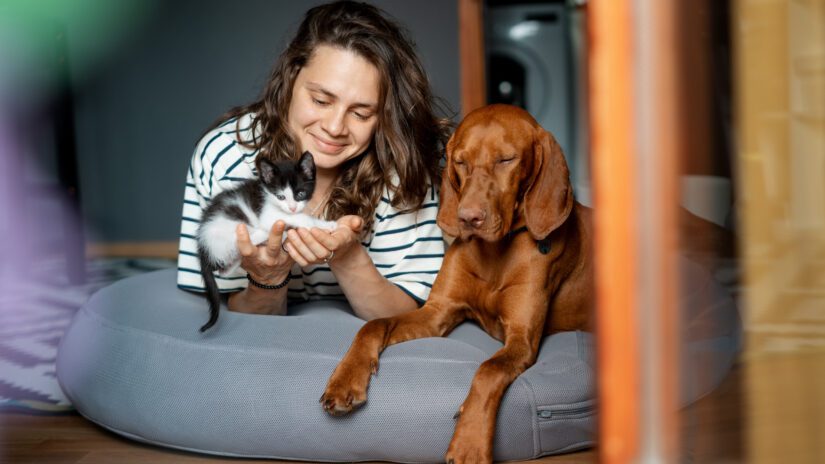Tips to become a successful pet parent

Adding a pet to your family is a big decision. From finding the right pet to making sure they’re cared for once you bring them home, there’s a lot to research and consider.
Here at Pinellas County Animal Services, we want to help you navigate that process, make the right choice for you and set yourself up to give your pet an amazing place to call home. Below are some tips to get you started.
Before you bring them home
Picking a pet
- Choose the right animal. Whether you’re a first-time pet owner or introducing a new pet to your already pet-filled home, it’s important to find a pet that will fit into your situation. Consider the breed, size and energy level for your lifestyle to make sure the animal thrives in your home.
- Ensure you’re ready. Taking in a new pet means a new responsibility at home. Make sure that you have the time and space to bring a pet into your life.
- Know your rights. If you find the perfect pet for you at a pet store, you have rights to protect you even after purchase through Florida’s Pet Lemon Law. If the new pet you purchase from a pet store is later determined to be unfit by a veterinarian, you have options. Learn more from the Florida Veterinary Medicine Association.
- Protect your finances. Pets can be costly. Buying a pet as well as the food, toys and even medical appointments can stack up quickly. In those situations, many people turn to pet loans, but be careful. It can be easy to borrow more money than you need and get stuck with a high interest loan and large monthly payments. Be sure you consider all your options for financial assistance as well as your long and short-term finances before signing up for that loan.
- Consider pet insurance. Medical care can be expensive, and insurance can help reduce that burden. See if pet insurance can be right for your situation from the American Veterinary Medical Association.
Preparing your house
- Give your pet enough space. Cats and dogs present different challenges for the type of space they’ll need to feel comfortable at home. Your dog will likely need space to stretch their legs, use the bathroom and go for walks. Your cat will need more space indoors for things like a litter box and entertainment toys.
- Test your new pet with your family/pets. Animals can have certain situations that don’t fit well with them. Meeting them individually may go well, but the pet may not feel as comfortable when meeting other members of your family including spouse/significant other, children and other pets. Make sure you introduce your new pet to your family before trying to bring them home, so they can get familiar with them on neutral territory.
- Get the supplies to keep your pet well-fed, exercised and entertained. Food and water are obvious necessities, but other supplies like a leash, harness, crate, toys and more can be vital to your pet’s adjustment as well. Research which items you may need to make you and your pet comfortable.
Once they’re home
Protecting your pet
- License your pet with Pinellas County. All cats and dogs in Pinellas County are required by law to have a license. Learn more about how to get yours now.
- Vaccinate your pet. Vaccinations can protect your pet from dangerous diseases such as rabies, distemper, parvo, kennel cough and more.
- Microchip your pet. When your pet gets lost, our Animal Services employees or a veterinary clinic will check for a microchip. With a quick scan, they can connect your pet to you and alert you how to pick them up. It’s also extremely useful should you and your pet get separated during an emergency. Learn more about how to prepare your pet for emergencies.
- Spay or neuter your pet. Spaying/neutering your pet helps us reduce pet overpopulation. They also reduce unwanted behaviors, such as aggression and urine marking. It can also prevent medical conditions, including reproductive cancers and prostate problems.
- Keep your pet in your home or in a fenced yard with proper shelter. It can get really hot in Florida and leaving your pet outdoors can lead to heat exhaustion or even heat stroke which can be deadly. If indoors is not an option, ensure your pet is kept in a fenced yard with shelter from the elements and access to clean drinking water. In Pinellas County, tethering, chaining or tying up your pet is not allowed unless you are with them.
Fitting into your neighborhood
- Clean up after your pet. On top of a clean neighborhood, picking up your pet’s messes can help stop the spread of diseases.
- Keep your pets on your own property. Letting your pet run-free can be dangerous to you, your neighbors and your pet. If you want to take your pet outside, be sure to keep them on a leash. It’s safer for your pet unless you’re inside a designated dog park.
- Be mindful of barking. Dogs can bark. It’s part of their nature. But 15 minutes of barking at nothing can result in a citation.